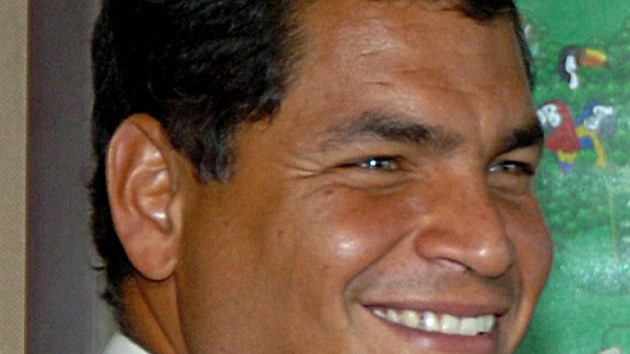Last month, Ecuador expelled 20 U.S. Defense Department employees from the country. Less than two weeks later, the U.S. announced it would withdraw its anti-narcotics personnel from Ecuador, dealing a further blow to America’s ailing counternarcotics partnerships in the Western Hemisphere.
Ecuador’s expulsion of U.S. military personnel “reflects the increase in capacities and resources of Ecuador to directly assume security and defense efforts independently,”
said a statement from the Ecuadorean Embassy in Washington. The statement pointed in particular to Ecuador’s own counternarcotics efforts from the previous year.
State Department spokeswoman Jen Psaki told reporters that while the United States would respect Ecuador’s decision, “we regret that the outcome will severely limit our bilateral security partnership.” She said that military cooperation between the two nations over four decades “has resulted in significant advances against drug trafficking, human trafficking, terrorism and other transnational crime.”
The moves come in a context of a
generally strained U.S. relationship with Ecuador under President Rafael Correa. At the same time, the plans for the State Department’s Bureau of International Narcotics and Law Enforcement (INL) to pull out of Ecuador will bring to three the number of countries in Latin America where the U.S. lacks a major counternarcotics presence, as InSight Crime’s Charles Parkinson
has pointed out. The U.S. has seen similar ruptures in its relationships with both Bolivia and Venezuela, which like Ecuador are key hubs for drug trafficking.
In testimony submitted to a recent hearing on the subject, Gen. John F. Kelly, commander of the U.S. Southern Command, stated that the United States “must remain engaged” in Latin America in order to maintain partnerships and “even minimal influence.” Among other things, counternarcotics partnerships in Latin America help U.S. agencies interdict large narcotics shipments, including at sea, which become much harder to track once they are broken down into smaller loads.
Kelly added that current budget cuts and the scarcity of surface ships for both the Navy and the Coast Guard continue to affect security cooperation efforts with countries in Latin America, which he called “the principal way we engage” on the continent. “The cumulative effect of our reduced engagement,” he warned, “is a relative but accelerated decline of trust in our reliability and commitment to the region.”
“Our relationship, our leadership and our influence in the Western Hemisphere are paying the price,” he said.
At the same hearing, Deputy Assistant Secretary of State for International Narcotics and Law Enforcement Affairs Luis Arreaga sounded a more hopeful note, pointing to cooperative efforts with Mexico and Colombia, as well as several regional initiatives. “While the task at hand is incredibly challenging,” he said, “we know our coordinated efforts are yielding results.”
“Regional partnerships between nations are flourishing,” he added. “Joint operations have become more common, and information-sharing is happening on a near real-time basis.”
The panel agreed that despite current challenges, U.S. cooperation had made a positive contribution to “the drug fight,” especially in Colombia. In his opening remarks, Arizona Republican Matt Salmon, who chairs the House Foreign Affairs subcommittee on the Western Hemisphere, said these efforts were successful because the partner countries had the “political will and leadership to win their country back from the terrorists and narco-traffickers.”
Going forward, “we need to find ways to better engage our regional partners,” he suggested, “and help them build capacity more efficiently and more effectively.”
But attempts to do that with Ecuador will continue to be stymied by poor relations with Correa. U.S. concerns with the direction of Ecuador’s government aren’t new. Even prior to last month’s expulsion of U.S. military personnel, a bipartisan group of eight U.S. senators had
written a letter to Correa expressing their “concern regarding the current state of the historic partnership between our two countries.” In particular, they were “deeply discouraged” by Ecuador’s decision to “impede U.S. development assistance for the people of Ecuador,” which had resulted in the closing of the United States Agency for International Development mission in Quito.
Further back, in 2009, Correa refused to renew U.S. access to an airbase at Manta, which the U.S. military used to detect the movement of drugs, including along the Ecuadorean coast. At the time, a
senior U.S. official said that the loss of the base left a “significant gap” in U.S. counternarcotics capabilities in the eastern Pacific.
But even with more resources and better cooperation, the government is not going to be able to halt drug trafficking altogether. As INL Assistant Secretary William Brownfield
said in recent remarks on the subject, “eradication, dismantling, interdiction, economic development—none of them in and of themselves solved the drug problem.” So what is to be done? “The correct response,” he said, “is all of the above and then a little bit more as well.”

